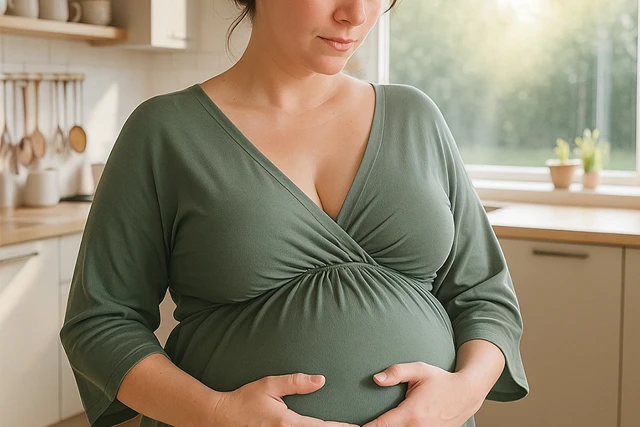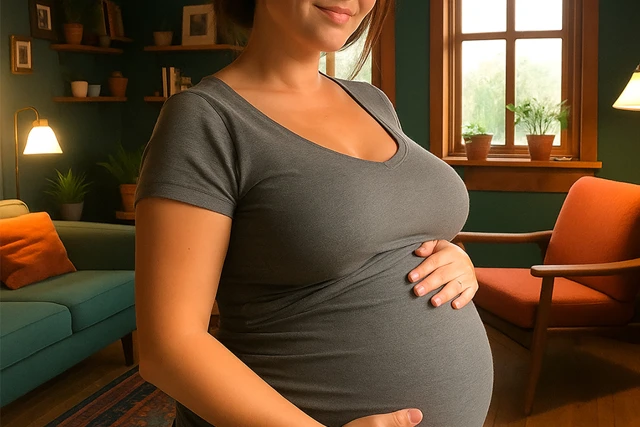The living environment plays an important role in the development of the fetus. During pregnancy, the mother's health and living conditions not only affect the mother's health but also directly impact the development of the child in the womb. From air quality, climate conditions, noise levels to working environment and geographical location, all contribute to shaping the development of the fetus.
This article will share in detail how the living environment affects the fetus. At the same time, we will learn about the importance of creating a good living environment to ensure the birth of healthy and beautiful babies and methods to help pregnant mothers have a healthy pregnancy and give birth to beautiful babies.

5 Environmental Effects on the Fetus
Air and Climate

5 Environmental Effects on the Fetus
Effects of Air Pollution
Air pollution, especially dust, chemicals and pollutants near landfills or sewage, can cause many health problems for mothers and fetuses. Pollutants in the air can enter the mother's body through the respiratory tract and hinder the development of the fetus.
- Smoke and toxic gases : Living near a landfill or sewage drain can cause pregnant women to inhale pollutants and toxic gases, which can expose their fetus to harmful elements. Research shows that air pollution can cause problems with the development of the fetus’ lungs and nervous system. For example, living near a heavily polluted area can increase the risk of premature birth or developmental disabilities such as:
- Brain Development Problems : Toxic smoke and dust can affect the development of the fetal brain, leading to delayed neurological development and mental disorders.
- Respiratory Problems : Exposure to fine dust and smoke can cause respiratory problems for the fetus, such as difficulty breathing.
- Polluted climate : Living in a place with polluted air not only affects the mother's health but also increases the risk of health problems for the fetus, such as respiratory problems and brain development.
- Toxic Chemicals : Chemicals from factories and landfills can cause birth defects and affect fetal development such as:
- Neural tube defects : include conditions such as hydrocephalus and spina bifida.
- Congenital heart defects : Aortic valve stenosis and three-chamber heart.
- Limb abnormalities : Conditions such as missing fingers, toes, short limbs, syndactyly, and extra fingers.
- Respiratory Health Effects : Smoke and dust from factories or landfills can cause respiratory problems such as coughing, asthma, and can even affect the development of the fetus' lungs, such as difficulty breathing, weak lungs and can lead to asthma.
Climate Effects: Too Hot or Too Cold
Too hot or too cold air can also affect the health of the mother and fetus. During pregnancy, temperatures that are too high or too low can cause complications.
- Overheating : Living in an environment that is too hot can cause dehydration, heatstroke for pregnant women and increase the risk of health problems for the fetus such as premature birth or problems with the development of the body and nervous system.
- Too Cold : On the contrary, living in an environment that is too cold can reduce blood circulation to the fetus, causing colds, flu and other diseases for pregnant women. Affect the development of body tissues and structures, including the face. Can reduce the immunity of pregnant women, leading to the risk of infections.
=> Impact : Air pollution and unsuitable climate can cause serious problems for fetal development, affecting the health and beauty of the baby after birth.
Noise Pollution During Pregnancy
The best sound level for pregnant women is from 10 decibels to 35 decibels. If this threshold is exceeded and the mother is regularly exposed to noise at 50 - 80 decibels for hours, the pregnant mother may experience many health problems such as frequent headaches, dizziness, digestive system damage, reduced resistance, endocrine hormones also cannot complete their inherent tasks, causing insomnia, disrupting daily activities.

5 Environmental Effects on the Fetus
According to research, women living and working in noise environments exceeding 80 decibels can cause problems for their fetuses. Noise affects fetal development and can have adverse effects on the health of both mother and baby. Negative effects can include increased risk of miscarriage, premature birth, fetal malnutrition, and effects on the baby's nervous system.
Effects of Noise Pollution.
Noise pollution is another environmental factor that can negatively affect the fetus. Living near areas with high noise levels, such as industrial stone crushing plants or mines, can cause a variety of problems for both the mother and the fetus.
- Industrial Noise : Pregnant women living near heavy industrial areas such as mines or manufacturing plants may be exposed to high levels of noise. Studies have shown that loud and continuous noise can cause stress, sleep disturbances that affect fetal development and may lead to premature birth or reduced intrauterine growth.
- Stress and sound : Studies show that loud noises can increase cortisol levels in the mother's body, which can cause problems with the fetus's brain development and psychology such as:
Pregnant women will experience anxiety, depression, insomnia, fatigue, and difficulty concentrating. Prolonged stress can lead to serious problems such as postpartum depression and other mental disorders.
High blood pressure, headaches, back pain, and digestive problems. Increased risk of heart disease, stroke, and gestational diabetes.
- Effects on Fetal Hearing : Studies have shown that exposure to loud noises can affect fetal hearing. Continuous and loud noises can cause damage to the baby's ears and nervous system such as:
- Stress and Anxiety : Noise can also cause stress and anxiety in pregnant women, leading to overproduction of the hormone cortisol. This can affect the development of the fetus' brain and immune system.
The fetus may be slow to develop, have low birth weight or be born prematurely. The newborn may be malnourished, have a weak immune system and be at high risk of respiratory and cardiovascular diseases.
Children may have problems with brain development, leading to intellectual disability, autism and behavioral disorders. Affecting children's ability to learn, think and socialize later.
=> Impact : Noise pollution can lead to chronic stress for pregnant mothers, negatively affecting fetal development, including the ability to hear and respond to the environment.
Impact of Work and Working Conditions
The working environment is also an important factor affecting the health of pregnant mothers and fetuses. A job that is too busy, too strenuous activities or too tiring work can lead to many health problems.

5 Environmental Effects on the Fetus
Overactive Activities
When a woman is pregnant, performing strenuous activities such as running fast, jumping high and falling, being pushed or hit in the abdomen can have a significant impact on the health of the fetus.
These actions can lead to serious consequences such as miscarriage and premature birth, seriously affecting the development of the fetus.
Too Busy and Stressful
- Overwork and Overexertion : Overwork during pregnancy, such as working at high intensity, working long overtime hours or performing heavy work, can cause fatigue, loss of appetite, insomnia, and stress, thereby adversely affecting the health of both mother and baby, increasing the risk of premature birth and slow fetal development.
- Work Stress : Being too busy, stressed and not having time to take care of yourself can lead to high stress levels, affecting the health of the mother and fetus. For example, pregnant women who work long hours without rest can experience problems with sleep and overall health.
- Lack of sleep : Tired work can cause lack of sleep, leading to reduced ability to provide nutrition and oxygen to the fetus. This can reduce the overall development of the fetus, affecting both the health and beauty of the baby such as:
- The fetus may be slow to develop and have a low birth weight. The child may have health problems such as malnutrition, a weak immune system and a high risk of respiratory and cardiovascular diseases.
- No Time to Take Care of the Fetus : Pregnant mothers who are too busy with work may not have enough time to take care of themselves and their fetuses properly. This can lead to malnutrition, lack of sleep and stress, which can negatively affect the development of the fetus such as:
Lack of care can affect the overall development of the fetus, leading to physical and mental retardation. Not having an adequate diet can cause the fetus to lack the vitamins and minerals necessary for development.
Lack of care can weaken the fetus' immune system, increasing the risk of illness and infection.
=> Impact : Over-stressed work and lack of sleep can lead to serious health problems for mother and fetus, including problems with facial development.
Infrastructure and Geography
Remote Area
- Difficulty in Check-ups : Not having regular check-ups can cause pregnant mothers to miss detecting potential health problems such as gestational diabetes, preeclampsia, or placental-related problems such as the risk of birth defects and premature birth.
- Distance from Hospitals and Medical Facilities : Living in remote areas, far from hospitals and medical facilities, can make it difficult to get proper prenatal care and checkups. Lack of access to timely medical services can lead to failure to detect and treat health problems of the mother and fetus early.
Pregnant women cannot have routine tests such as ultrasounds, blood tests, or blood pressure checks.
Complications such as preeclampsia, gestational diabetes, or placental problems may not be detected and treated promptly, increasing the risk of serious complications.
Lack of regular checkups can make it difficult to monitor important fetal health indicators, such as heart rate, development of internal organs, and placental health.
Difficult Roads : Difficult and inconvenient roads also increase the risk of not being able to reach the hospital in time in emergency situations, affecting the safety of both mother and baby.
Complications such as preeclampsia, gestational diabetes, or placental problems may not be detected and treated promptly, leading to more serious conditions.
Healthcare Infrastructure
Lack of Health Facilities : Living in remote areas can lead to lack of health facilities. Inability to access timely health services can cause serious health problems for the mother and fetus.
Pregnant women may not be able to get necessary routine check-ups such as ultrasounds, blood tests, and blood pressure checks. If a pregnant woman becomes ill during pregnancy, the lack of medical facilities can delay treatment and management.
A mother living in an area lacking high-quality medical facilities may not receive adequate care throughout her pregnancy.
Ensuring the Best Development for the Fetus
Choosing the right living environment is important to ensure your baby develops healthily. Here are some ways to improve your living environment for optimal fetal development:
- Choose a Clean Living Environment : Try to live in an area with good air quality, use an air purifier and stay away from polluted areas to ensure your living space is always clean and airy.
- Minimize Noise : If you live near a noisy area, find ways to minimize your exposure to noise by using soundproofing devices or moving to a quieter, more comfortable area for the expectant mother to rest.
- Consider Your Work : Choose a job that is low-stress and requires little physical effort. Make sure you have time to take care of yourself and your baby. Adjust your work so that it is not too busy, take time to rest and take care of yourself, reduce stress and fatigue.
- Choose an Area with Good Healthcare Facilities : If possible, move to an area with adequate healthcare facilities and easy access to healthcare services. Ensure that pregnant mothers can have timely prenatal check-ups and receive timely medical care.
The Importance of Living Environment to the Fetus
A mother’s living environment during pregnancy needs to be focused not only on the physical aspect but also on the mental and emotional aspects. Creating a healthy, safe and quiet living environment not only helps the mother reduce stress but also contributes significantly to the healthy development of the fetus.
Mothers need to be supported and equipped with the right information and find ways to ensure they and their babies are protected from negative environmental influences, thereby increasing their chances of giving birth to healthy and beautiful children.
To ensure your baby has the best start, come to us for advice and support on the best methods to support you on your journey to motherhood, giving you and your baby the perfect start.
Let us accompany you on your pregnancy journey, helping you have a healthy pregnancy and give birth to beautiful and healthy babies.
Website: https://wilimedia.co
